Software developers are the architects behind computer programs and applications. They translate user needs into functional software solutions, ensuring that systems run efficiently and effectively.
Key skills for a software developer include proficiency in programming languages like Java, Python, and C#, as well as critical thinking and teamwork. Understanding these skills and how to assess them is crucial for recruiting the right talent.
Candidates can write these abilities in their resumes, but you can’t verify them without on-the-job Software Developer skill tests.
In this post, we will explore 9 essential Software Developer skills, 11 secondary skills and how to assess them so you can make informed hiring decisions.
Table of contents
9 fundamental Software Developer skills and traits
The best skills for Software Developers include Programming Languages, Data Structures, Algorithms, Version Control, Database Management, Debugging, Software Testing, APIs and Object-Oriented Programming.
Let’s dive into the details by examining the 9 essential skills of a Software Developer.
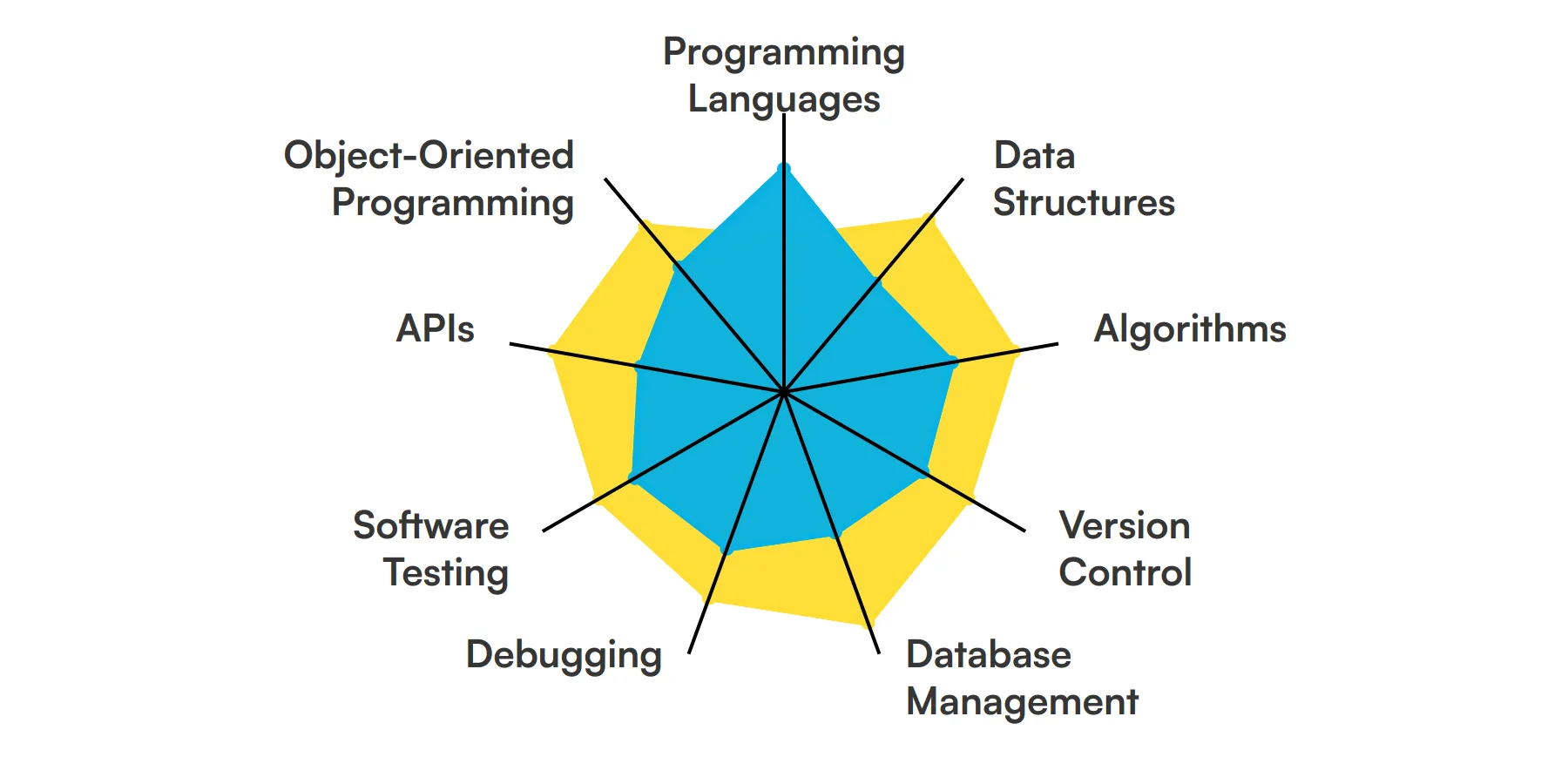
Programming Languages
A software developer must be proficient in multiple programming languages like Python, Java, or C++. These languages are the building blocks for creating software applications and systems.
Data Structures
Understanding data structures such as arrays, linked lists, and trees is crucial for solving complex problems efficiently. They help in organizing and storing data in a way that enables efficient access and modification.
Check out our guide for a comprehensive list of interview questions.
Algorithms
Knowledge of algorithms is essential for a software developer to write efficient code. Algorithms help in performing tasks like searching, sorting, and optimizing, which are fundamental to software development.
Version Control
Using version control systems like Git allows developers to track changes, collaborate with team members, and manage code versions. It is a critical skill for maintaining the integrity of the codebase.
Database Management
A software developer should be adept at managing databases using SQL or NoSQL technologies. This skill is necessary for storing, retrieving, and manipulating data efficiently.
For more insights, check out our guide to writing a Database Administrator (DBA) Job Description.
Debugging
Debugging is the process of identifying and fixing bugs in the code. A developer must be skilled in using debugging tools and techniques to ensure the software runs smoothly.
Software Testing
Testing is crucial to ensure the software meets the required standards and functions correctly. Developers should be familiar with various testing methodologies like unit testing, integration testing, and automated testing.
Check out our guide for a comprehensive list of interview questions.
APIs
Understanding and working with APIs (Application Programming Interfaces) is essential for integrating different software systems. APIs allow developers to connect and interact with external services and data.
Object-Oriented Programming
Object-Oriented Programming (OOP) principles like inheritance, encapsulation, and polymorphism are fundamental for designing scalable and maintainable software. A developer must be proficient in OOP to create robust applications.
11 secondary Software Developer skills and traits
The best skills for Software Developers include Cloud Computing, Containerization, CI/CD, Front-End Development, Back-End Development, Mobile Development, DevOps, Security, UX/UI Design, Networking and Agile Methodologies.
Let’s dive into the details by examining the 11 secondary skills of a Software Developer.
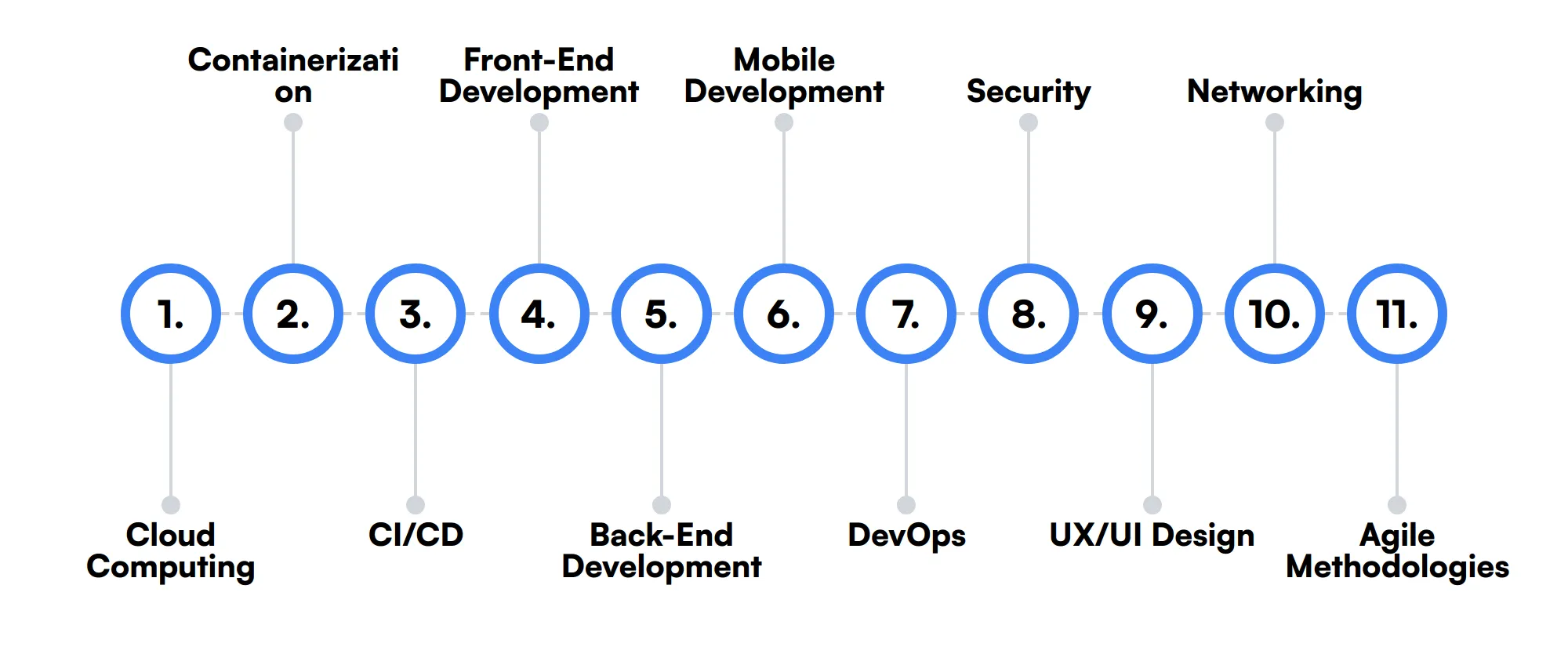
Cloud Computing
Knowledge of cloud platforms like AWS, Azure, or Google Cloud is beneficial for deploying and managing applications in a scalable environment.
Containerization
Familiarity with containerization tools like Docker and Kubernetes helps in creating, deploying, and managing containerized applications efficiently.
CI/CD
Continuous Integration and Continuous Deployment (CI/CD) practices are important for automating the software development process, ensuring faster and more reliable releases.
Front-End Development
Skills in front-end technologies like HTML, CSS, and JavaScript are useful for creating user interfaces and enhancing the user experience.
Back-End Development
Understanding back-end technologies and frameworks like Node.js, Django, or Ruby on Rails is important for developing the server-side logic of applications.
Mobile Development
Knowledge of mobile development frameworks like React Native or Flutter is beneficial for creating cross-platform mobile applications.
DevOps
DevOps practices involve collaboration between development and operations teams to improve the software development lifecycle. Familiarity with DevOps tools and methodologies is advantageous.
Security
Understanding basic security principles and practices is important for protecting applications from vulnerabilities and ensuring data privacy.
UX/UI Design
Basic knowledge of UX/UI design principles helps developers create intuitive and user-friendly interfaces, enhancing the overall user experience.
Networking
Understanding networking concepts and protocols is useful for developing applications that communicate over networks, ensuring efficient data transfer and connectivity.
Agile Methodologies
Familiarity with Agile methodologies like Scrum or Kanban helps in managing projects effectively, promoting iterative development and continuous improvement.
How to assess Software Developer skills and traits
Assessing the skills and traits of software developers is more than just glancing at their resume. It's about understanding how well they can solve problems, adapt to new technologies, and fit into your team's culture.
While the list of skills like Programming Languages, Data Structures, Algorithms, and others are important, knowing how to evaluate these skills effectively is key. Traditional interviews often don't reveal the true depth of a candidate's abilities or their practical expertise.
This is where practical assessments come into play. Tools like Adaface offer tailored assessments that measure not just theoretical knowledge, but also practical skills in areas such as Debugging, Software Testing, and Database Management. By using these assessments, companies have seen a 2x improvement in the quality of their hires and an 85% reduction in screening time. Learn more about how Adaface can transform your hiring process here.
Each software developer role might require a different subset of skills. For instance, not all positions will need strong skills in APIs or Object-Oriented Programming. It's important to choose assessments that match the specific needs of the role you are looking to fill.
Let’s look at how to assess Software Developer skills with these 5 talent assessments.
Technical Aptitude & Python Test
Our Technical Aptitude & Python Test evaluates candidates on their proficiency in Python programming and technical aptitude. The test covers Python basics, object-oriented programming, data structures, algorithms, debugging, and problem-solving.
The test assesses understanding of Python basics, data types, conditional statements, loops, functions, lists, dictionaries, file handling, object-oriented programming, and exception handling. It includes scenario-based MCQs and a coding question to test hands-on Python programming skills.
Successful candidates demonstrate a strong grasp of Python programming concepts and the ability to solve coding problems effectively.
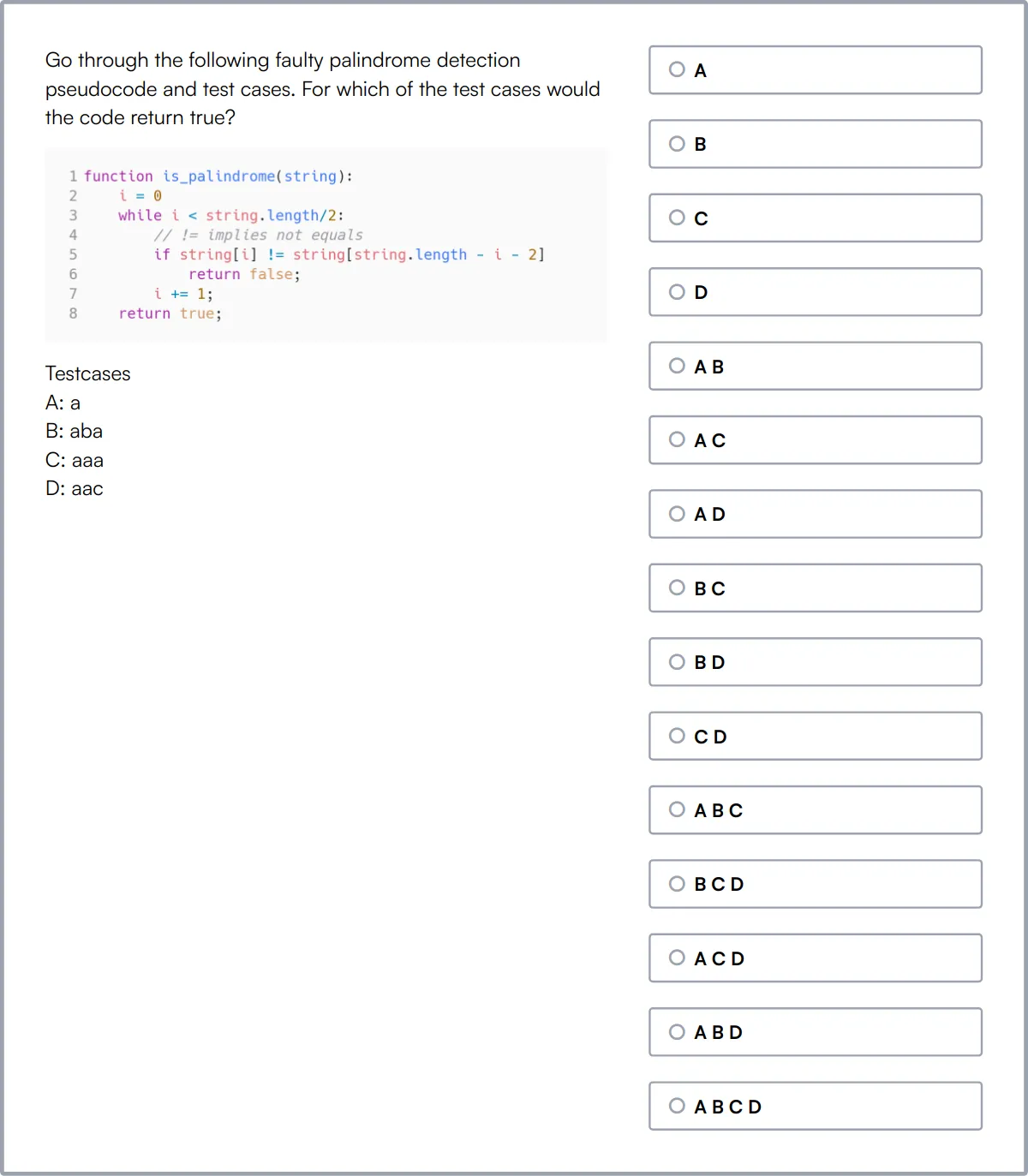
Software Engineering Online Test
Our Software Engineering Online Test evaluates candidates on their understanding of core computer science concepts. The test covers data structures, algorithms, databases, programming paradigms, and design patterns.
The test assesses knowledge in object-oriented programming, database design, algorithms and data structures, testing and quality assurance, web development, software security, and code optimization. It includes scenario-based MCQs and a coding question to evaluate problem-solving and hands-on programming ability.
High-scoring candidates show proficiency in designing efficient algorithms, optimizing code, and ensuring software security and quality.
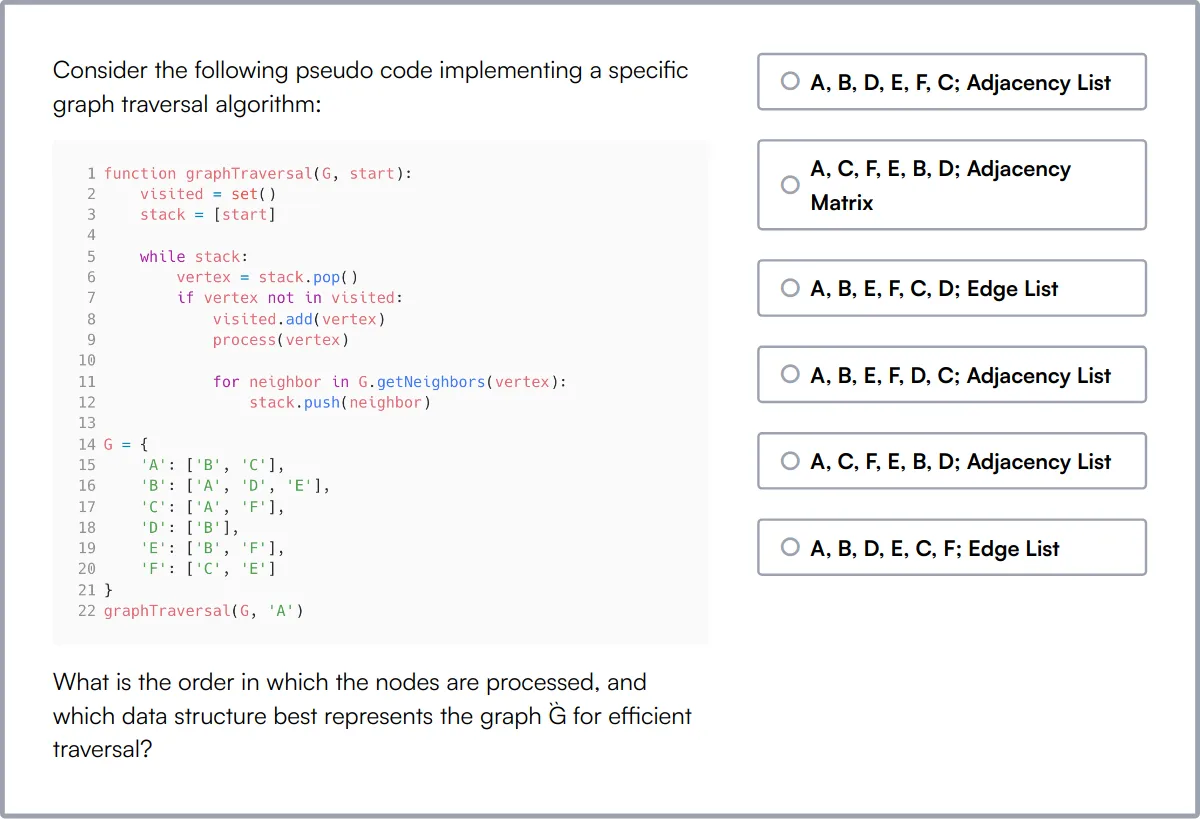
Git Online Test
Our Git Online Test evaluates candidates on their understanding of Git, a popular version control system. The test covers basic and advanced Git commands, conflict resolution, and source code management.
The test assesses knowledge in Git basics, repository creation, branching and merging, committing changes, conflict resolution, remote repositories, rebasing, Git workflows, Git commands and concepts, and Git branching models.
Candidates who perform well demonstrate the ability to manage source code effectively, resolve conflicts, and use Git workflows efficiently.
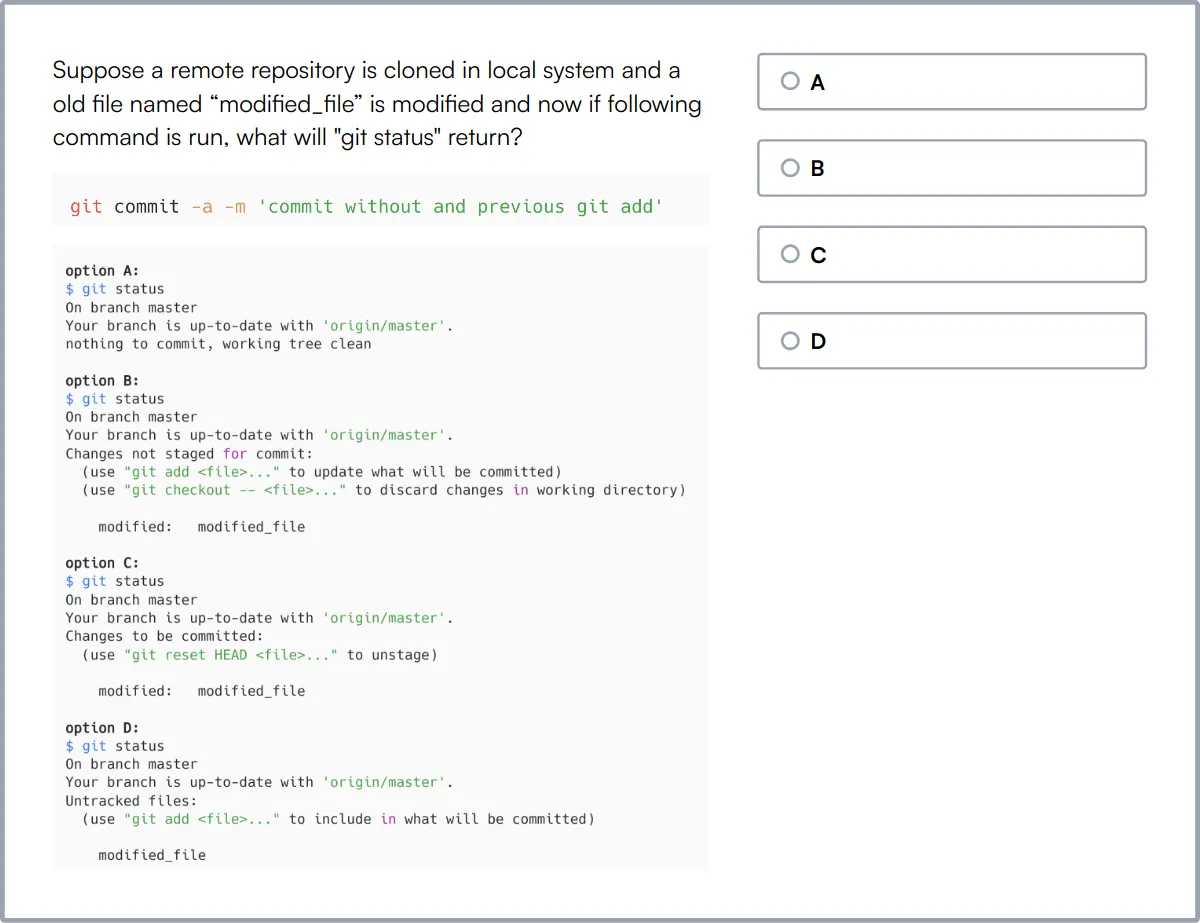
MySQL Online Test
Our MySQL Online Test evaluates candidates on their proficiency in using MySQL. The test covers SQL queries, database design, normalization, indexing, transactions, and stored procedures.
The test assesses understanding of MySQL, database design, SQL queries, normalization, indexing, joins, data manipulation language, data definition language, views, stored procedures, triggers, and transactions.
Successful candidates demonstrate the ability to work with MySQL databases, manage and manipulate data, and optimize database performance.

System Design Online Test
Our System Design Online Test evaluates candidates on their proficiency in designing software systems. The test covers system requirements, architectures, design patterns, and high-level design specifications.
The test assesses knowledge in system design, algorithms and data structures, network protocols, database design, distributed systems, cloud computing, performance optimization, and microservices architecture.
Candidates who excel in this test demonstrate the ability to design scalable, efficient, and secure software systems that meet both functional and non-functional requirements.
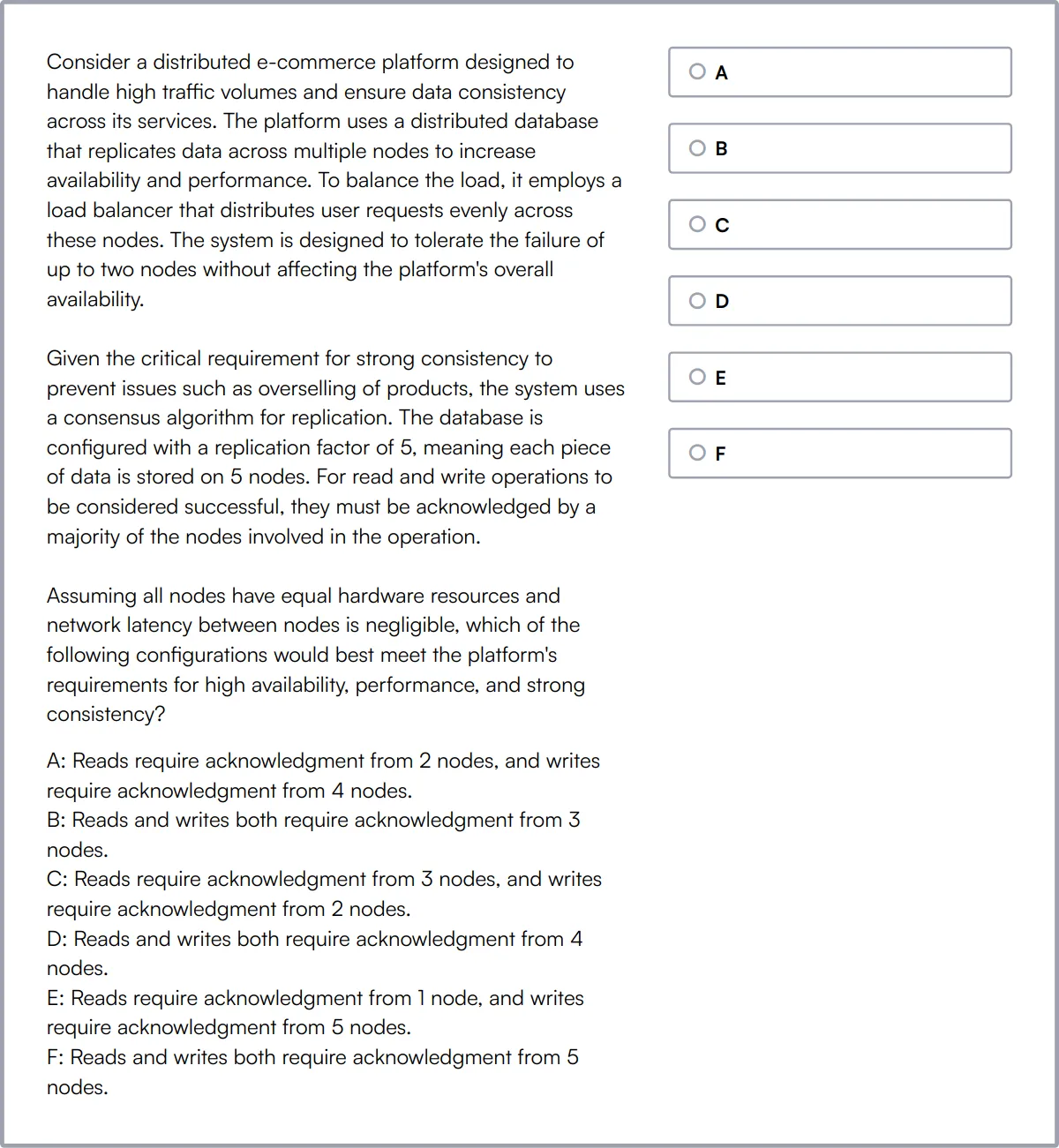
Summary: The 9 key Software Developer skills and how to test for them
| Software Developer skill | How to assess them |
|---|---|
| 1. Programming Languages | Evaluate proficiency in coding and syntax in various programming environments. |
| 2. Data Structures | Assess understanding and application of efficient data organization methods. |
| 3. Algorithms | Test ability to solve problems and optimize processes effectively. |
| 4. Version Control | Check familiarity with tools for tracking and managing code changes. |
| 5. Database Management | Gauge capability to design, query, and maintain databases. |
| 6. Debugging | Determine skill in identifying and fixing software bugs. |
| 7. Software Testing | Evaluate techniques for ensuring code correctness and reliability. |
| 8. APIs | Assess ability to integrate and maintain various software interfaces. |
| 9. Object-Oriented Programming | Test understanding of class-based and object-oriented coding principles. |
Software Engineering Online Test
Software Developer skills FAQs
What programming languages should a software developer know?
Software developers should be proficient in at least one of the major programming languages such as Java, Python, or JavaScript. The choice of language depends on the project requirements and the technology stack of the company.
How important are data structures and algorithms for software developers?
Understanding data structures and algorithms is key for optimizing code and solving complex problems efficiently. These skills are often assessed in technical interviews to evaluate problem-solving abilities.
What is the role of version control in software development?
Version control systems like Git help developers manage changes to source code, collaborate with others, and maintain a history of project changes. It's a fundamental tool for team-based projects.
Why is database management skill important for developers?
Database management is crucial for designing, implementing, and maintaining the database systems that store and retrieve application data. Knowledge of SQL and NoSQL databases is often required.
What should recruiters know about CI/CD in hiring developers?
CI/CD stands for Continuous Integration and Continuous Deployment, key practices in DevOps to automate the testing and deployment of software. Familiarity with these practices indicates a candidate's ability to streamline development processes.
How can software testing skills be assessed in an interview?
Assess software testing skills by asking candidates to design test cases, explain different testing methods like unit testing or integration testing, and use testing frameworks they are familiar with.
What is the significance of UX/UI design skills in software development?
UX/UI design skills are important for creating intuitive and engaging user interfaces. Developers with these skills can contribute to the front-end development process, enhancing user satisfaction and accessibility.
How does knowledge of cloud computing benefit software developers?
Cloud computing skills enable developers to design, deploy, and manage applications on cloud platforms. This knowledge is beneficial for scaling applications and integrating various cloud services.

40 min skill tests.
No trick questions.
Accurate shortlisting.
We make it easy for you to find the best candidates in your pipeline with a 40 min skills test.
Try for freeRelated posts
Free resources



